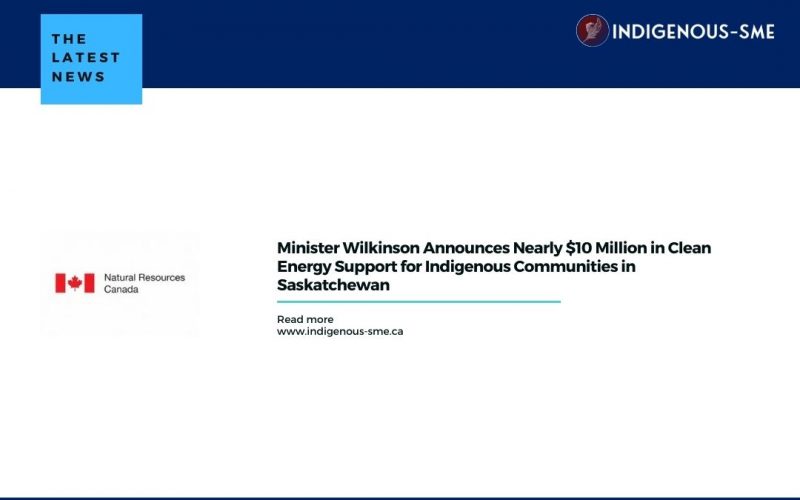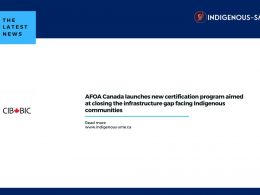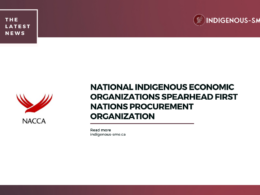REGINA, SK, July 11, 2022 /CNW/ – The Government of Canada is partnering with Indigenous communities and Indigenous businesses in Saskatchewan to support projects that deliver clean and affordable energy. These projects are critical to building long-term prosperity and energy security, while contributing to Canada’s ambitious climate goals.
Today, the Honourable Jonathan Wilkinson, Canada’s Minister of Natural Resources, announced investments totalling nearly $10 million for five projects in Saskatchewan that will enhance understanding of energy use and support renewable energy technology in rural, remote and Indigenous communities.
These projects include:
- $4,374,600 to Meadow Lake Tribal Council (MLTC) Program Services to build capacity and develop a regional approach to renewable energy, energy efficiency and conservation, by and for Indigenous communities.
- $2,000,000 to Mee-Toos Forest Products Ltd., a subsidiary of the Peter Ballantyne Group of Companies,for a bioheat project to replace existing propane heating systems at two schools in Pelican Narrows and Deschambault Lake and reduce fossil fuel usage by 90 percent.
- $1,604,554 to MLTC Solar Energy to deploy an 816-kilowatt solar farm in the regional municipality of Tecumseh in southern Saskatchewan. The project will be 100-percent owned by the nine First Nations of the Meadow Lake Tribal Council and located on Indigenous-owned lands. The solar facility will be a stepping stone for the community to develop other renewable energy projects.
- $975,000 to the First Nations Power Authority of Saskatchewan for a capacity-building project focused on Community Energy Planning for Saskatchewan Indigenous communities that currently do not receive natural gas service from SaskEnergy.
- $840,000 to the University of Saskatchewan to create a master’s of sustainability in security degree to meet the training needs of northern, remote and Indigenous communities through distance education and purpose-driven practical experience to lead to sustainable community energy development.
These investments demonstrate the Government of Canada’s ongoing commitment to supporting innovative projects in the energy and forestry sectors toward a clean, sustainable and competitive energy and resource industry while reducing greenhouse gas emissions, advancing economic reconciliation and fighting climate change.
Quotes
“I am pleased to be in the province in which I grew up to announce the federal government’s support for five vital projects that will advance economic reconciliation, deploy clean energy and create sustainable jobs. Our partners in Saskatchewan are deploying renewable energy, displacing coal-based electricity and other carbon-emitting products, improving energy efficiency and training the next cohort of Indigenous clean energy leaders.”
The Honourable Jonathan Wilkinson
Minister of Natural Resources Canada
“Alongside Indigenous climate leaders in Saskatchewan and across the country, we are tackling climate change head-on. We are working together to bring green energy to Indigenous communities, to reduce carbon emissions and to protect the environment. By investing in innovative solutions, we are changing the way communities power themselves.”
The Honourable Patty Hadju
Minister of Indigenous Services and Minister responsible for the Federal Economic Development Agency for Northern Ontario
“The Smart Renewable and Electrification Pathways program projects are a stepping stone for our communities to learn and lead in community energy planning. As we build internal capacity for our communities, we work toward energy autonomy and a cleaner future for generations who come after us.”
Richard Ben
Tribal Chief, Meadow Lake Tribal Council
“With the support of Natural Resources Canada through the Clean Energy for Rural and Remote Communities program, Mee-Toos Forest Products Ltd., as part of the business development arm of The Peter Ballantyne Cree Nation can take another step toward not only contributing to a cleaner environment but also toward contributing to meeting our community’s energy needs while providing local employment and development opportunities.The effort that we as a company have put in towards the utilization and involvement of our local resources toward projects of this design have been many and the support we have received from NRC along the way has been well designed and formatted for the success we have achieved and will continue to deliver as we move forward toward a cleaner and more prosperous future for our communities and the world.”
Gary Merasty
Chief Executive Officer, Peter Ballantyne Group of Companies
“FNPA is delighted to work with those First Nations in Saskatchewan that currently do not have natural gas as an option for heating their homes. Our experienced team of qualified professionals will be working directly with 15 communities to deliver community energy plans working in close collaboration with SaskPower and SaskEnergy over the next two years to review various cleaner energy options.”
Guy Lonechild
Chief Operating Office, First Nations Power Authority
“The Master’s of Sustainability in Energy Security at the University of Saskatchewan is a groundbreaking program designed to empower Indigenous people and their communities to work towards reducing carbon emissions. Graduates of the program acquire skills to lead the development of energy projects that provide renewable energy options and maximize social and economic benefits to local communities. Scholarships are available to Indigenous students who apply for the program. Our ongoing collaboration with Indigenous people and industry will train a new generation of interdisciplinary professionals and energy practitioners to transform energy systems and promote sustainable energy patterns in northern, remote and Indigenous communities.”
Gary Merasty
Senior Advisor, Indigenous and External Relations School of Environment and Sustainability
University of Saskatchewan
Quick facts
- Federal funding for the MLTC capacity building project and the MLTC Solar Energy project is provided through Natural Resources Canada’s Smart Renewables and Electrification Pathways (SREPs) program, a four-year, $964-million program that provides support for smart renewable energy and electrical grid modernization projects. This program will significantly reduce greenhouse gas emissions by enabling increased renewable energy capacity to provide essential grid services while supporting Canada’s ongoing transition to a net-zero economy by 2050 as well as Canada’s commitment to achieving a 100-percent net-zero-emitting electricity system by 2035.
- Indigenous Services Canada contributed $250,000 for the MLTC Solar Energy project through the Community Opportunity Readiness Program (CORP). CORP provides project-based funding for First Nation and Inuit communities located in the provinces for a range of activities to support their pursuit of economic opportunities.
- Federal funding for the Mee-Toos Forest Products, First Nations Power Authority of Saskatchewan and the University of Saskatchewan’s projects is provided through Natural Resources Canada’s Clean Energy for Rural and Remote Communities program, a $220-million program that strives to reduce reliance on diesel in rural and remote communities by deploying and demonstrating renewable energy projects, encouraging energy efficiency and building local skills and capacity. The program is part of the government’s Investing in Canada plan, a more than $180-billion investment in public transit projects, green infrastructure, social infrastructure, trade and transportation routes, and Canada’s rural and northern communities.
- Canada’s 2030 Emissions Reduction Plan: Clean Air, Strong Economy ensures Canada will remain a world leader in clean power. In Budget 2022, Canada committed to investing an additional $600 million over five years to the SREPs program to continue to support renewable electricity and grid modernization projects, and it has invested an additional $300 million over five years to ensure that rural, remote and Indigenous communities that currently rely on diesel have the opportunity to be powered by clean, reliable energy.
Related Information
- MLTC Program Services
- Mee-Toos Forest Products
- Peter Ballantyne Group of Companies
- MLTC Solar Energy
- First Nations Power Authority of Saskatchewan
- University of Saskatchewan
- Smart Renewables and Electrification Pathways
- Community Opportunity Readiness Program
- Clean Energy for Rural and Remote Communities
- Investing in Canada plan
- 2030 Emissions Reduction Plan: Clean Air, Strong Economy
- Budget 2022
Follow us on Twitter: @NRCan (http://twitter.com/nrcan)
SOURCE Natural Resources Canada








